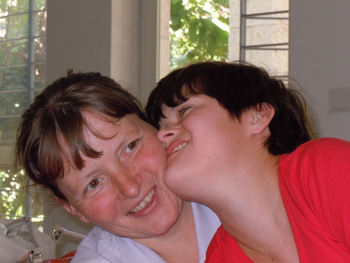
Lisa is an expat psychologist whom for a while collaborated with Expatclic. We asked her to write an article the empty nest. This is what she invites you to read. Thanks Lisa!
Your children are not your children.
They are the sons and daughters of Life’s longing for itself.
They come through you but not from you,
And though they are with you yet they belong not to you.
On Children, Kahlil Gibran
Every life is made up of a series of developmental phases, which, as our lives progress, allow us to grow, and more often than not, improve. Some of these phases, such as learning to talk or to walk, are crucial turning points. They involve leaving behind what we were to become something else: saying goodbye to the past and preparing for the future. Human beings are programmed for change, but not always does change come about smoothly and painlessly.
For example, during adolescence, big changes can often be traumatic, accompanied by feelings of inadequacy or depression.
One important characteristic of each human being is sociability: each of us belongs to different groups or systems, such as family and friends, which give us our sense of belonging and identity, feelings that are crucial for a healthy and satisfying life. Every personal turning point, every individual developmental phase, entails a change in the systems we belong to. This is like cybernetics, which teaches us that every single change in the parts of a system entails a change, a readjustment, of the system as a whole.
Huge changes at a personal level, the upheaval of roles, and a sense of loss might accompany this sensitive developmental milestone.
The family — that container of most of these changes — is one of the systems most subjected to change. So the family, too, undergoes developmental phases, such as the birth of a first child, which can lead to stressful readjustments. The ability of individual members of a system — in this case the parents — to adapt to change in a positive way, guarantees the smooth passage to a new individual and family developmental phase.
What does adapting to change mean for an individual? It means modifying our status, our identity. It means accepting the changes that the system needs to make to function again, leaving a part of ourselves behind so that we can experiment with new roles, and facing the unknown without fear of getting lost. This can be a tough task, and emotionally challenging.
Having an activity outside the home allows us to preserve our identity just at the time when it becomes separated from the identity of our family and children.
The so-called empty nest syndrome is a significant turning point faced by every family with children: the fledglings have learnt to fly and leave the nest, soaring towards a new future. In some cases, this flight may just be temporary. Moving on is a natural consequence of becoming an adult; however, this does not always happen smoothly. Huge changes at a personal level, the upheaval of roles, and a sense of loss might accompany this sensitive developmental milestone.
Leaving aside the doubts felt by those who fly off, I would like, in this short article, to focus on the parents who are left behind. They are faced with individual and couple changes which can escalate into major crises.
From a personal point of view, both for men and women, the empty nest syndrome can coincide with difficult personal changes. For a woman, it’s likely to happen when she’s going through the menopause, with all its associated hormonal and psychological turbulence, such as sadness, nostalgia, and depression. So a woman may have to face her own severe identity crisis: Who am I? What am I becoming? What’s my role in the family and in society?
we need to take leave of our children in our minds and our hearts, and to do so, we need time.
For men, it’s similar. The nest might empty just at the time when he is going into retirement, even if men may feel less traumatised and depersonalised when the children leave.
To better understand the psychological effects of this state of mind, we can compare it with a period of mourning: feelings of anger and sadness for what is experienced as the loss of a child and of one’s identity, nostalgia for the past, denial of the present, fear of the future.
In this traumatic phase of a woman’s life, work is one of the variables that can make all the difference. Having an activity outside the home allows us to preserve our identity just at the time when it becomes separated from the identity of our family and children.
…the relationship within the couple in this new family framework might get out of kilter.
What are the strategies we can put in place to make the transition smoothly? As I hinted earlier, the solution lies in focusing on our own needs and aspirations, looking after ourselves rather than our children, taking the extra time we suddenly have to do everything we have always wanted to do. Isn’t that an exciting prospect? Of course, if it were as easy as that, there wouldn’t be libraries filled with literature on the subject. In order to appreciate our ‘rebirth’, we unfortunately have to go through the period of mourning mentioned earlier: we need to take leave of our children in our minds and our hearts, and to do so, we need time. We must not be afraid to ask other people to share their experiences, or to talk about our own sadness. This could be a different way of still feeling we are a part of our children’s lives. It can be helpful, for example, to organise a lunch together, to talk about the subject. The gradual awareness that our kids are interesting individuals, even seen from afar, helps us through the mourning period: we’ve done a good job, and now we can enjoy our success and our well-deserved rest.
When the nest empties, the new mental and physical space which is generated must be harmonised for a new life as a couple.
As if the empty nest weren’t bad enough, the relationship within the couple in this new family framework might get out of kilter. Two individuals, who painstakingly have managed to create a balance, adapting to their progeny’s needs, forgetting, sometimes, why they had fallen in love and decided to live together, suddenly find themselves alone, with no-one else in the way. While this might seem exciting, it can at the same time be terrifying. Past unresolved problems, or opportunities missed for the sake of the children, might come knocking at the door of our conscience, accompanied by insidious questions such as: What did we enjoy doing before we had children? Do we still enjoy the same things? What if we don’t enjoy them any more? What’s the point of staying together now that we are no longer parents?
And so, a common project, the most important, or at least the most obvious, bites the dust. At this point, for the couple to be able to become something new, adapting to change, they need to find, reinvent, or rediscover new common projects, and set fresh objectives. The keys are experimenting and communicating. It’s a bit like giving our home a makeover: we change the furnishings and reorganise the space. This is essential in order to create harmony in a house, and above all, in a couple. When the nest empties, the new mental and physical space which is generated must be harmonised for a new life as a couple.
I’d like to conclude by giving a definition of harmony, which I hope will stimulate reflection and ways out for whoever may be restructuring their lives:
Harmony in music, in words, in thoughts, in relationships, and then in colours, and then in movements, in voices, in clothes, in handwriting, and in lines, and in every beautifully decorated aspect which life presents to us is a highly elevated, sublime concept.
It is not only an emotional and intimate understanding; not simply a unity of intent, an alliance; not only a refined proportion, and an accurate disposition. Harmony is a boat held together by planks with perfectly dovetailed joints: a boat that has a purpose, that can sail across the sea, that with its combination of matched parts can face the fury of the elements: poised, and elegant.
Lisa Tranchellini
Translated from Italian by Paola Fornari


